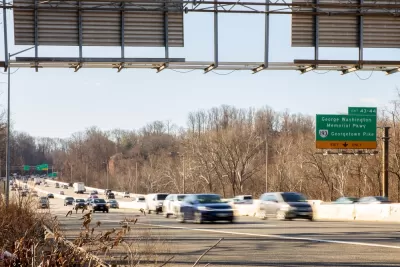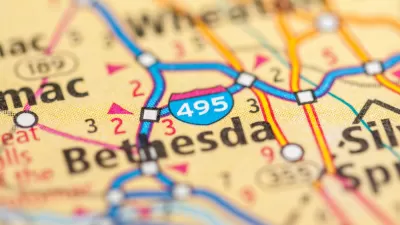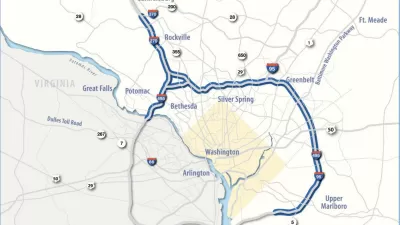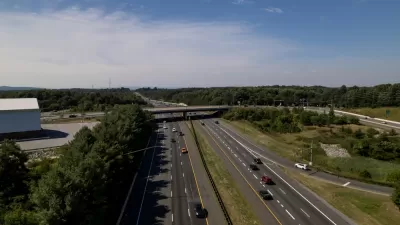In a victory for Governor Larry Hogan, who has championed the project, the Federal Highway Administration is allowing the Beltway expansion project to move ahead.

Maryland Governor Larry Hogan’s controversial $5 billion plan to expand parts of the Beltway and Interstate 270 can move forward after the Federal Highway Administration signed off on the project, reports Ian Duncan in the Washington Post. “Maryland is planning to add two toll lanes to the Beltway in each direction, between the Virginia side of a new and expanded American Legion Bridge and the exit for Old Georgetown Road in Bethesda,” and convert two I-270 lanes to toll lanes. The plan was scaled back in May 2021 in response to strong opposition from some officials and environmental groups.
The project also includes some funding for transit. “The contracting group with which the state intends to partner would provide $300 million for transit in Montgomery County over the life of the project. The state transportation department would build a new facility and provide a fleet of buses, and allocate a further $60 million to design transit projects in the county.”
Nevertheless, transit advocates criticize the project, saying the approval process lacked transparency and “ignored valid concerns from members of the public, and advocates from the environmental and transportation communities.” According to a separate article in Maryland Matters by Danielle E. Gaines, transit advocate Ben Ross cited “possible scientific fraud,” saying that “he found unexplained changes in the traffic models the state used to determine how much time motorists would save by using toll lanes.” The Federal Highway Administration stated they failed to find evidence of any fraud. The project now requires approval of the contract by the state’s Board of Public Works.
FULL STORY: Controversial Hogan plan for Beltway, I-270 toll lanes gets green light

Maui's Vacation Rental Debate Turns Ugly
Verbal attacks, misinformation campaigns and fistfights plague a high-stakes debate to convert thousands of vacation rentals into long-term housing.

Planetizen Federal Action Tracker
A weekly monitor of how Trump’s orders and actions are impacting planners and planning in America.

In Urban Planning, AI Prompting Could be the New Design Thinking
Creativity has long been key to great urban design. What if we see AI as our new creative partner?

King County Supportive Housing Program Offers Hope for Unhoused Residents
The county is taking a ‘Housing First’ approach that prioritizes getting people into housing, then offering wraparound supportive services.

Researchers Use AI to Get Clearer Picture of US Housing
Analysts are using artificial intelligence to supercharge their research by allowing them to comb through data faster. Though these AI tools can be error prone, they save time and housing researchers are optimistic about the future.

Making Shared Micromobility More Inclusive
Cities and shared mobility system operators can do more to include people with disabilities in planning and operations, per a new report.
Urban Design for Planners 1: Software Tools
This six-course series explores essential urban design concepts using open source software and equips planners with the tools they need to participate fully in the urban design process.
Planning for Universal Design
Learn the tools for implementing Universal Design in planning regulations.
planning NEXT
Appalachian Highlands Housing Partners
Mpact (founded as Rail~Volution)
City of Camden Redevelopment Agency
City of Astoria
City of Portland
City of Laramie





























